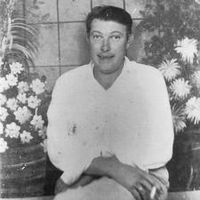Annotation:Valse de 'Cadien: Difference between revisions
No edit summary |
m (Text replacement - "garamond, serif" to "sans-serif") |
||
| (One intermediate revision by one other user not shown) | |||
| Line 1: | Line 1: | ||
=='''Back to [[{{BASEPAGENAME}}]]'''== | =='''Back to [[{{BASEPAGENAME}}]]'''== | ||
---- | ---- | ||
<p><font face=" | <p><font face="sans-serif" size="4"> | ||
'''VALSE DE 'CADIEN''' (Cajun {Acadian} Waltz). Cajun, Waltz. USA, Louisiana. A Major. Standard tuning (fiddle). A(Vocal)BBA(Vocal)BBA(Vocal)B. 'Cadien is a shortened version of Acadien (or Cajun in modern vernacular), referring to the French population forcibly dispersed from Nova Scotia (known as Acadia) by the English in 1755 who resettled in the country west of New Orleans at the encouragement of the Spanish, who at the time controlled the region and welcomed settlement by a Catholic people. Various theories have been proffered about the origin of the word Acadia, but it may be that it was derived from an Indian word, ''aquaddie'', referring to the pollok fish found in the banks off Nova Scotia. | '''VALSE DE 'CADIEN''' (Cajun {Acadian} Waltz). Cajun, Waltz. USA, Louisiana. A Major. Standard tuning (fiddle). A(Vocal)BBA(Vocal)BBA(Vocal)B. 'Cadien is a shortened version of Acadien (or Cajun in modern vernacular), referring to the French population forcibly dispersed from Nova Scotia (known as Acadia) by the English in 1755 who resettled in the country west of New Orleans at the encouragement of the Spanish, who at the time controlled the region and welcomed settlement by a Catholic people. Various theories have been proffered about the origin of the word Acadia, but it may be that it was derived from an Indian word, ''aquaddie'', referring to the pollok fish found in the banks off Nova Scotia. | ||
<br> | <br> | ||
<br> | <br> | ||
The tune was first recorded by Angélas LeJeune. | The tune was first recorded by Angélas LeJeune. "His virtuoso technique brought him first prize in Louisiana’s first statewide accordion contest, which was sponsored by the Opelousas Herald in 1929. The newspaper reported that LeJeune was accompanied by fiddlers Dennis McGee and Ernest Frugé. The prize was $50 and LeJeune’s playing attracted the attention of a representative of OKeh Records and the day after the contest he and his accompanists went to New Orleans to make some records. Among other artists with whom LeJeune worked is fiddle player and maker Lionel LeLeux (b. 1912, Louisiana, USA, d. Louisiana, USA)." [http://www.allmusic.com/artist/ang%C3%A9las-lejeune-mn0001722031] | ||
<br> | <br> | ||
<br> | <br> | ||
</font></p> | </font></p> | ||
<p><font face=" | <p><font face="sans-serif" size="4"> | ||
[[File:LeJeune.jpg|200px|thumb|left|Iry LeLeune]] | [[File:LeJeune.jpg|200px|thumb|left|Iry LeLeune]] | ||
''Source for notated version'': Iry LeJeune (La.) [Francois]. | ''Source for notated version'': Iry LeJeune (1928-1955, La.) [Francois]. Iry was Angélas LeJeune's nephew. | ||
<br> | <br> | ||
<br> | <br> | ||
</font></p> | </font></p> | ||
<p><font face=" | <p><font face="sans-serif" size="4"> | ||
''Printed sources'': Francois ('''Yé Yaille, Chère!'''), 1990; pp. 58-59. | ''Printed sources'': Francois ('''Yé Yaille, Chère!'''), 1990; pp. 58-59. | ||
<br> | <br> | ||
<br> | <br> | ||
</font></p> | </font></p> | ||
<p><font face=" | <p><font face="sans-serif" size="4"> | ||
''Recorded sources'': <font color=teal>Atma Classique 22522, Suzie Leblanc - "Tout Passe - Chants D'Acadie" (2007). Goldband Records GB-LP7741, Iry LeJeune.</font> | ''Recorded sources'': <font color=teal>Atma Classique 22522, Suzie Leblanc - "Tout Passe - Chants D'Acadie" (2007). Goldband Records GB-LP7741, Iry LeJeune.</font> | ||
<br> | <br> | ||
<br> | <br> | ||
</font></p> | </font></p> | ||
<p><font face=" | <p><font face="sans-serif" size="4"> | ||
See also listing at:<br> | See also listing at:<br> | ||
Hear the waltz played on accordion on youtube.com [http://www.youtube.com/watch?v=thhhIwnalsI]<br> | Hear the waltz played on accordion on youtube.com [http://www.youtube.com/watch?v=thhhIwnalsI]<br> | ||
Latest revision as of 14:41, 6 May 2019
Back to Valse de 'Cadien
VALSE DE 'CADIEN (Cajun {Acadian} Waltz). Cajun, Waltz. USA, Louisiana. A Major. Standard tuning (fiddle). A(Vocal)BBA(Vocal)BBA(Vocal)B. 'Cadien is a shortened version of Acadien (or Cajun in modern vernacular), referring to the French population forcibly dispersed from Nova Scotia (known as Acadia) by the English in 1755 who resettled in the country west of New Orleans at the encouragement of the Spanish, who at the time controlled the region and welcomed settlement by a Catholic people. Various theories have been proffered about the origin of the word Acadia, but it may be that it was derived from an Indian word, aquaddie, referring to the pollok fish found in the banks off Nova Scotia.
The tune was first recorded by Angélas LeJeune. "His virtuoso technique brought him first prize in Louisiana’s first statewide accordion contest, which was sponsored by the Opelousas Herald in 1929. The newspaper reported that LeJeune was accompanied by fiddlers Dennis McGee and Ernest Frugé. The prize was $50 and LeJeune’s playing attracted the attention of a representative of OKeh Records and the day after the contest he and his accompanists went to New Orleans to make some records. Among other artists with whom LeJeune worked is fiddle player and maker Lionel LeLeux (b. 1912, Louisiana, USA, d. Louisiana, USA)." [1]

Source for notated version: Iry LeJeune (1928-1955, La.) [Francois]. Iry was Angélas LeJeune's nephew.
Printed sources: Francois (Yé Yaille, Chère!), 1990; pp. 58-59.
Recorded sources: Atma Classique 22522, Suzie Leblanc - "Tout Passe - Chants D'Acadie" (2007). Goldband Records GB-LP7741, Iry LeJeune.
See also listing at:
Hear the waltz played on accordion on youtube.com [2]
